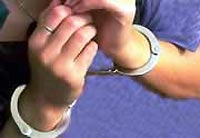Former soldier who killed his three sons and half-sister to be executed in Tennessee
A former soldier convicted of killing his three sons and their half-sister with an assault rifle became the first inmate executed in the electric chair in Tennessee since 1960.

Daryl Holton, 45, was pronounced dead at 1:25 a.m. CDT (0625 GMT) Wednesday at Riverbend Maximum Security Institution.
Prison Warden Ricky Bell asked Holton if he had any last words. He mumbled something inaudibly and Bell asked him to repeat what he said. Holton replied, "Two words: I do."
Prison officials then placed a wet sponge and metal plate on Holton's head. During the process, Holton kept his eyes closed. As officials used a towel to wipe away water from the sponge, Holton said, "Don't worry about it."
Holton chose the electric chair over the state's preferred execution method of lethal injection. Under Tennessee law, death row inmates can choose, if their crimes were committed before 1999.
Even though the state had not performed an electrocution in nearly 47 years, the execution occurred without any serious delays or mistakes.
A black shroud was placed over Holton's head and a cable was connected to the bottom of the chair. Around 1:16 a.m. CDT (0616 GMT), a 20-second shock was administered. Holton's back straightened and his hips moved up out of the chair before he slumped back.
After a 15-second pause, Holton was given a second shock that lasted 15 seconds. He was pronounced dead seconds later.
Holton, a Gulf War veteran, had confessed to the 1997 killings, saying he lined up the children at his uncle's auto repair garage and shot them, two at a time.
Holton told police that he killed the children because his ex-wife had not let him see them for several months and that he had intended to kill his ex-wife and himself but instead turned himself in.
After the execution, a statement was read on behalf of the mother of the children, Crystal Holton: "Today all the anger, hatred and a long time of nightmares can finally leave me. It will be replaced by all the sweet innocent wondrous love that only a child can give. And I am blessed that I have and will always have that love times four."
Holton's attorney, David Raybin, said Holton was finally "free from the demons that haunted him."
"He had made a conscious choice to give up on his appeals, but in the end did not give up on the legal system," Raybin said.
Holton came within a day of execution a year ago before a federal appeals court issued a stay. He was among four death row inmates whose executions were postponed in February, when Gov. Phil Bredesen placed a 90-day death penalty moratorium.
Bredesen had cited a number of problems with the state's execution guidelines, including a jumble of conflicting instructions that mixed lethal injection instructions with those for the electric chair.
The Correction Department completed the revision of its procedures in March, the moratorium was allowed to expire and the four executions were rescheduled.
A group of about 80 attorneys petitioned the state Supreme Court on Tuesday to stop the electrocution, saying the execution method was cruel and unusual punishment. But the court rejected the petition.
"Considering both the circumstances of this case and the relevant legal precedent, we decline to exercise our supervisory authority to ... withdraw the order of execution," the court said.
Holton, who for the most part refused to file appeals in his case, had no other legal challenges.
On Nov. 30, 1997, Holton told the four children - Steven, 12; Brent, 10; Eric, 6; and their half-sister Kayla, 4 - that they were going Christmas shopping in Shelbyville, a small town about 50 miles (80 kilometers) south of Nashville.
Nearly five hours later, Holton walked into the Shelbyville Police department and confessed to shooting the children.
Holton has said he suffered from severe depression when he committed the murders. His lawyers maintain he has a long history of mental illness and may suffer from post traumatic stress disorder from his military service in the 1991 Gulf War.
Subscribe to Pravda.Ru Telegram channel, Facebook, RSS!





